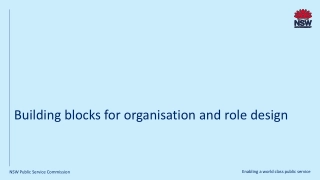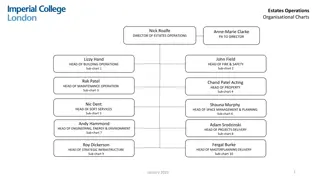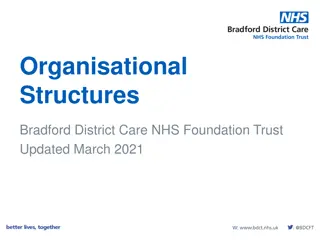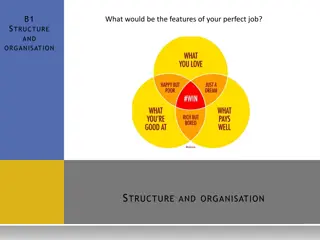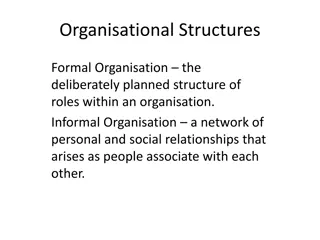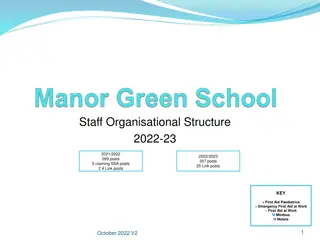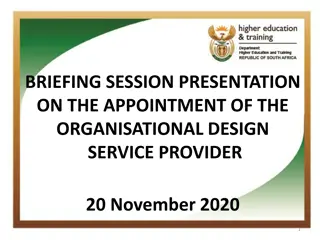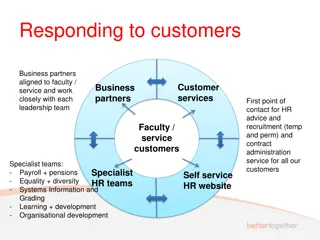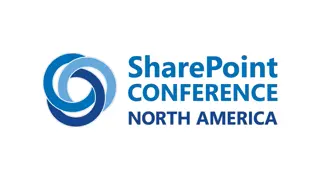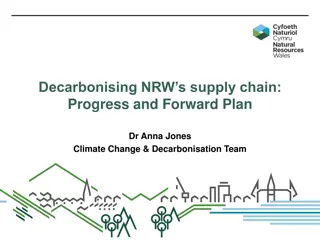Effective Organisational Measures for NRW Management Teams
Implementing a structured approach to NRW management involves the establishment of a Steering Committee and Task Team. The Steering Committee oversees integration, decision-making, resource allocation, and accountability. The NRW Task Team, led by an experienced caretaker, defines tasks, creates contact points, and fosters ownership across departments. Coordinators within the team handle specific responsibilities like updating management plans, GIS database maintenance, technical coordination, and commercial coordination. Team members execute tasks such as zone analysis, house visits, meter readings, and leak detection.
Download Presentation

Please find below an Image/Link to download the presentation.
The content on the website is provided AS IS for your information and personal use only. It may not be sold, licensed, or shared on other websites without obtaining consent from the author. Download presentation by click this link. If you encounter any issues during the download, it is possible that the publisher has removed the file from their server.
E N D
Presentation Transcript
Organisational NRW Management
Content Organisational measures Key Performance Indicators Water Balance Calculations Plan-Do-Check-Act Cycle 2
Organisational measures STEERING COMMITTEE, NRW TASK TEAM
Steering Committee A NRW steering committee consist of a group of people (often from the management team, but also that are in direct contact with the employees) that can drive, accelerate and check the work in progress and results that are achieved, by: Integrating NRW activities in the organizational structure of the company, make decisions and approve plans Making resources available and holding people accountable 4
NRW task team A NRW task team consisting of commercial and technical department staff will help to: Have tasks and responsibilities well defined Create contact points, for managers, other employees as well as customers Create buy-in among staff members and raise the feeling of ownership through all departments and levels of the company The NRW task team should be coordinated by an experienced NRW caretaker , who can write/update the NRW management plan, initiate, drive and monitor NRW management activities and report back to management. 5
NRW task team coordinators Function Caretaker Tasks Write/update NRW approach (spanning several years) - Initiate, drive and monitor NRW management activities - Ensure quality work - Report to management Update the complete GIS database of the DMA (including customer s GPS locations) - - GIS specialist(s) Help to select suitable areas for DMAs - Report status to team caretaker Support with planning and preparing DMAs - - Technical specialist Coordinate technical team - Report all activities to team caretaker Drive continuous improvement of the customer database - - Commercial specialist Coordinate creditors and debtors - Report status to team caretaker - 6
NRW task team members Function Tasks Zone analysts - Executing house visits Register meter readings - Detect leakages and other problems (such as illegal connections and payment problems) - Locate all clients using GPS locations. - Plumbers Make adjustments to the supply network, installing bulk water meters and valves - Detect leakages and other problems (such as illegal connections and incomplete installations) - Repair located leakages, install/repair water meters and solve other technical problems within the DMA Detect leakages and other problems (such as illegal connections) - Leakage surveyors - Possibly repair located leakages (if only temporarily until more technical support is available) Update the database of the DMA and verify all customers - Creditors - Check invoices and verify if all customers in the area receive them - Inform the debtors on defaulters Update the database of the complete area. Register all consumers that do not pay their bills or that are disconnected - Debtors - Send and collect fines - Check if fines are paid and if defaulters are disconnected - 7
Key Performance Indicators KPIS, MONITORING
Key Performance Indicators (KPI) Key performance are (measurable) indicators that help a utility to: Better understand water losses Define and set targets for improvement Measure and compare performance Develop standards Monitor compliance Prioritise investments 9 KEY PERFORMANCE INDICATORS
KPIs for NRW Main KPI s: NRW Total water produced Total water sold Technical PI s Commercial PI s: Number of meters read Number of meters tested Number of meters replaced % of unmetered connections Stolen meters Defective meters detected Illegal cases investigated Number of leaks and bursts reported Number of leaks and bursts repaired Average repair time Average pressure Amount spent on pipeline maintenance Number of leak detection surveys Number of leaks detected 10 KEY PERFORMANCE INDICATORS
KPIs for physicallosses NRW in %: frequently used. However, it favours utilities with high consumption, low pressure, and intermittent supply ILI: an excellent indicator of physical losses, one that takes into account how the network is managed 11 KEY PERFORMANCE INDICATORS
KPI monitoring KPIs can be measured to keep track of performance and analysed to understand the impact on utility performance. Different reporting methods can be chosen. It is useful to use software tools that can analyse and visualise the data. Jan Feb Mar May Jun Jul Aug Sep Oct Nov Dec Non Revenue Water (%) General NRW KPI's Total water produced Total water sold Data handling customer accountability Number of meters read % of meters read % of meters (for which consumption is) estimated 0.5 Number of accounts Unauthorised consumption Meters reversed Meters tampered with Meter by-passes Illegal connections (not yet registered) Illegal cases investigated & confirmed Customer meter accuracy Number of meters tested Number of meters replaced Pipeline management and maintenance Amount spent on pipeline maintenance Speed and quality of repairs Number of leaks and bursts reported Number of leaks and bursts repaired Pressure management Average pressure 55 51 51 45 40 33 56 33 22 30 22 2000 1850 900 1850 900 2200 1200 2000 1200 1800 1200 1800 800 1800 1200 1800 1400 2000 1400 1800 1400 900 100 0.5 100 0.5 0.5 200 100 0.5 0.5 200 200 200 200 80 0.4 0.6 200 200 200 200 200 1 0 1 0 1 0 1 0 1 0 1 0 1 0 200 200 200 200 200 200 200 200 2 5 0 0 0 2 5 0 0 0 2 5 0 0 0 2 5 0 0 0 2 5 0 0 0 2 5 0 0 0 2 5 0 0 0 2 5 0 0 0 7 2 5 0 0 0 2 5 0 0 0 13 2 5 5 100 20 100 20 100 20 100 20 100 20 100 20 100 20 100 20 100 20 100 20 100 20 1200 5000 15000 5000 7000 6000 5000 5000 5000 3000 6000 10 10 70 70 70 70 130 82 100 82 75 75 70 70 70 70 70 70 90 75 70 70 3 3 3 6 4 3 3 3 3 3 3 Definition KPI: increased compared to previous month KPI: decreased compared to previous month KPI: same level compared to previous month 12 12 KEY PERFORMANCE INDICATORS
NRW MIS Scorecard Monitor 13 KEY PERFORMANCE INDICATORS
Plan-Do-Check- Act Cycle
Plan-Do-Check-Act Cycle To keep track of performance and learn from experiences, it helps to initiate regular Plan, Do, Check, Act (PDCA) meetings with the key people involved (i.e. steering committee, NRW task team) 15 PLAN DO CHECK ACT CYCLE
PDCA: Check Do Check Collecting data Implement actions Data input Create actions Data check Plan Act Data analysing 16 PLAN DO CHECK ACT CYCLE
Collecting Data Standard template, one person to check final version reports 1. Ongoing process 2. Every month same data (KPIs) 3. 17 PLAN DO CHECK ACT CYCLE
PDCA: Check Do Check Collecting data Impement actions Data input Create actions Data check Plan Act Data analysing 18 PLAN DO CHECK ACT CYCLE
Data Input Put data in MIS Tool 1. Do it consistently (by one person only) 2. Make sure the data is complete 3. 19 PLAN DO CHECK ACT CYCLE
PDCA: Check Do Check Collecting data Implement actions Data input Create actions Data check Plan Act Data analysing 20 PLAN DO CHECK ACT CYCLE
DataCheck Is the data correct? 1. Objective view on data 2. Done by the same people monthly 3. 21 PLAN DO CHECK ACT CYCLE
PDCA: Act Do Check Collecting data Implement actions Data input Create actions Data check Plan Act Data analysing 22 PLAN DO CHECK ACT CYCLE
Data Analysing Compare data previous month and current month to explain NRW 1. Draw conclusions from the data analysis 2. Discuss monthly with NRW team 3. 23 PLAN DO CHECK ACT CYCLE
PDCA: Plan Do Check Collecting data Implement actions Data input Create actions Data check Plan Act Data analysing 24 PLAN DO CHECK ACT CYCLE
Create Actions Specific Measurable Accepted Realistic Time bound Create an action plan from the conclusions drawn from data analysis 1. Make sure actions are SMART, make people responsible and accountable 2. Record actions in meeting 3. 25 PLAN DO CHECK ACT CYCLE
PDCA: Do Do Check Collecting data Implement actions Data input Create actions Data check Plan Act Data analysing 26 PLAN DO CHECK ACT CYCLE
Implement Actions Execute actions according to plan, use actionlist in MIS Tool 1. Keep regular team meetings to discuss the status, problems and successes 2. Report the actions undertaken and hold each other responsible 3. 27 PLAN DO CHECK ACT CYCLE
Multi-year NRW strategy
Multi-year NRW strategy framework 1. Organize discussions to hear opinions (of different departments and cadres of staff) on current operations, previous NRW reduction projects, existing NRW management schemes and ideas on how to plan and run the current project 2. Create due awareness 3. Create a guiding team 4. Training on NRW management (for all departments and cadres of staff) following a training Decide on a project area 5. Set/prioritise targets considering available human resources and budget; define performance indicators 6. Organise human resources: create a project team 7. Collect needed materials 8. Create DMAs; study DMAs 9. Plan and implement NRW reduction measures 10.Consider appropriate scaling-up approach; embed NRW management in utilities standard operations 29 MULTI-YEAR NRW STRATEGY

 undefined
undefined






